
Recently on Cyclingnews.com |
An interview with Susan Stewart of Flanders-iteamNova.com
New year, new baby, new team
By Jon Anderson
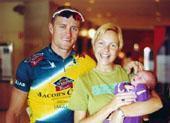 |
With a new year, new baby and new team, along with a to-do list that must be toted around in a wheel barrel, somehow Susan Stewart - idea woman and driving force behind iteamNova - manages to keep her head above water.
Between the Australian National Championships and the Le Tour de Langkawi, Stewart found a bit of time to discuss with Jon Anderson the iteamNova concept, the team's performance in 2002 and the merger with the Belgian-based Flanders squad.
Cyclingnews: What is the iteamNova concept?
Susan Stewart: The iteamNova concept is that the public gets behind a team and provides the financial support to put the team on the road. In exchange, the public gets ownership of the team and can feel a part of the whole existence of the team.
iTeamNova from the saddle:
|
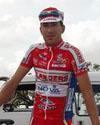 |
Age: 24yrs Residence: Sydney, Australia and Gent, Belgium
Turned pro: 2002
Cyclingnews: What was your best race ever? What was special about
this race?
Trent Wilson: I finally won the 2002 NSW State RR/Hornsby
to Swansea after finishing third or second four years in a row. I always
wanted to win this race as a kid since it's my local classic.
CN: Why are you riding for Flanders-iteamNova?
TW: I suppose I grabbed the attention of Dave McKenzie
after the 2001 Herald Sun Tour. Once offered a spot, I jumped at the opportunity
and once again signed for 2003.
CN: What sets iteamNova apart from other teams?
TW: Aussies! You can't go past the team morale of
having a few Aussie riders in the team.
CN: On personal level what do you bring to the team? What do you
bring to the team off the bike?
TW: I suppose I bring youth to the team. I'd like
to think I have a good sense of humor; I'm easy going and get on with
everyone in the team.
CN: In regards to the iteamNova team in 2002 what worked and what
fell flat on its face?
TW: I think the main factor was that the team stuck
together through the tough patches and was great in the good patches.
CN: Tell us something about yourself that would surprise us?
TW: How do I answer that... I like jokes and coffee
shops!
Click here for Trent's Cyclingnews diary
CN: Where did the idea come from?
SS: Before I met Dave [McKenzie], I was working on the administrative side of cycling, firstly in organising events and then as Executive Officer for the peak body of the sport in Victoria. I started studying e-commerce by distance education while I was living overseas to update my qualifications.
The idea was really just a marriage of my experience and my study - a search for alternative funding methods for a cycling team using the global reach of the Internet. The demise of the Linda McCartney team was really a catalyst for the whole thing, as it shows how precarious a team structure can be when placed in the control of one major sponsor.
CN: How did you become personally involved?
SS: I thought of the idea, I sought funding to get the idea off the ground and sponsorship to support the idea. I did the business planning, financial planning and marketing planning and I was also the mail girl.
CN: In 2002 you set up, funded, and operated a team using a concept that was previously unheard of in professional cycling. Did the idea work, and if so, can you provide some specific examples to support it?
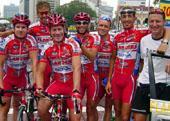 |
SS: I guess it is a matter of opinion to say if the idea worked or not. We are still here and that's a good start! Also, I know of other teams that have now started or picked up similar concepts - so I guess it has merit.
Personally I was a little disappointed with the membership figures that we generated in 2002, however, the members that did come on board were very supportive and encouraging of the whole thing. In 2002, we generated 69 percent members from Australia, 17 percent UK and 12 percent USA, then about 16 countries made up the remainder of the members. So as far as global reach goes, we did something right.
You have to remember that it is a new concept and will take a while for people to get behind and believe in what we are doing. The hardest thing for people to come to terms with is that what we are doing will replace a major corporate sponsor in the future. For example, we estimate to run a Tour de France team we need a global membership of 60,000 people. Henk Vogels was talking recently about what it was like to have one million people watching the final stage of the Tour de France roadside. All I could think was that we need six per cent of these people to get behind this idea.
CN: How many members did you have in 2002, and what are your membership goals for 2003?
SS: We attracted approximately 1000 members in 2002. Our aim for 2003 is 1500 full members, 300 non-Internet members and 300 junior members. We are still trying to establish what it is about the membership that will attract people and how we can build on that to attract the figures that we need.
However, this could also be a Catch-22 where we need the bigger name riders to attract the members and without the financial support up front we can't contract the riders.
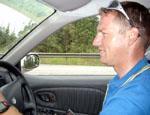 |
CN: In your role as a team manager, how did you establish yourself so that riders, sponsors and other team managers would take you seriously?
SS: I didn't really think about it. I guess just getting the team up and running was indication enough that I was serious about what I was doing. Realistically, Sean, Phil and Franky, in their roles of DS, acted as a buffer between me and the actual racing community.
iTeamNova from the saddle:
|
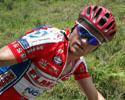 |
Age: 28
Residence: Melbourne, Australia and Gent, Belgium
Turned pro: 1997
Cyclingnews: Why are you riding for Flanders-iteamNova?
David McKenzie: Because my wife wouldn't allow me
to race for another team!
CN: What sets iteamNova apart from other teams?
DM: Of course the membership aspect, other teams have
a membership concept, but we have the whole package. A great internet
site that allows the supporters to get as close as possible to the riders,
plus all the prizes and goodies to be had when you become a member is
second to none.
Additionally, we have a team of riders who made sacrifices last year all in the name of keeping iteamNova alive and going onto bigger things in 2003.
CN: On a personal level what do you bring to the team?
DM: I contribute a lot of the reports and interact
with the members, also because of my role within the team and my profile,
I'm often asked to speak at functions on behalf of the team.
CN: In regards to the iteamNova team in 2002 what worked and what
fell flat on its face?
DM: The membership worked to a certain degree, not
to its highest expectations, but it did work. We proved this by surviving
the year and coming out the other side still alive. The De Rosa competition
didn't work as well as we hoped. Twelve people went in the draw to win
a $9000 bike. Not bad odds! We had to try things and see what worked and
what didn't.
CN: Can you tell us something about yourself that would surprise
us?
DM: When I was 15 years old, I lived on a golf course
with my family and practically played every day. It got to a point where
my parents realised I enjoyed it so much they offered to buy me clubs
and pay for professional lessons. I instantly stopped playing golf each
day and went full on with my cycling. And never looked back.
CN: What was the team's greatest achievement in 2002?
SS: Still being in existence at the end of the year.
CN: What was the lowest point?
SS: Dealing with the financial stresses of putting the team on the road, based on a largely unknown budget.
CN: For 2003 your team merged with a Belgian squad and formed Flanders-iteamNova. Why? How did the merger come about?
SS: It came through a mutual associate. Franky Van Haesebroucke who had been helping us out in Belgium was also a good friend of Frans Assez (manager of Flanders). Franky realised that we were both after the same goals - to develop the team to being a strong force in Category 2 and saw the potential for the teams to join up. He also felt that we were suited in both working ethos and team philosophy for the merger to be a success. So far he has been right!
CN: What are your specific responsibilities within the new Flanders-iteamNova organization?
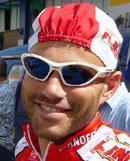 |
SS: This year I will take on more of a role in developing and servicing the membership. I guess this has been my area of interest since the conception of the team and now I will have more time to concentrate on that, while letting Frans get on with the job of the managing the team, which he knows a lot more about.
CN: What are your short-term and long-term goals for Flanders-iteamNova?
SS: The short term goals are to ensure that the merger is successful and brings stability to the team to ensure the riders can go about doing what they do best. My long term goal has always been to build a team that is 80 percent supported by its membership - I can't say 100 per cent because that is not realistic.
CN: In 2002 you built a cohesive, supportive environment among iteamNova riders, members, and staff. Won't the merger with the Flanders team tend to separate the team and membership groups into two separate camps due to language and logistics?
SS: The website is now in English and Dutch to incorporate our new partners. Also, we will be based around the same area as Flanders to make sure the daily logistics of operation are easier. We have a mutual associate in Franky to bridge any language or cultural gaps and I think the bottom line is that we are trying to achieve the same goals.
CN: What percentage of the team's 2003 budget will be funded via the membership package?
SS: Approximately 60 percent, however 100 percent of the membership profits goes towards putting the team on the road, so if we exceed expectations there will be more to put towards the team.
CN: Isn't a merger with the Flanders squad a step toward greater reliance on sponsorship dollars and a step away from the membership-funded team you initially envisaged?
SS: It is a side step but not a step away. It allows me some space to develop the concept and to investigate how we can build the membership to a level that will support the team, without the stress of instability that we had in 2002.
CN: In 2000 Linda McCartney suddenly decided not to continue sponsorship of the team; riders were surprised, devastated and left hung out to dry without contracts for the year. You developed iteamNova and set out to make sure that would never occur again. If the Flanders-iteamNova sponsors pulled their support today, would the team fold as the Linda McCartney team did?
SS: If the sponsors as a collective decided to pull out it would be difficult, however, there isn't the one major sponsor that the whole structure hinges on.
CN: Do you foresee your organization developing such that it is can function independently of sponsorship dollars? If so, when?
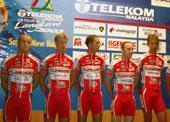 |
SS: It is an interesting question and, philosophically, one that probably takes some elucidation. I guess as the organisation grows, more sponsors, members and riders will be attracted to being a part of it.
My aim is to remain true to the philosophy of the whole membership concept and make the members the integral part of the whole organization. If sponsorship dollars allow us to develop better subscriber packages, an unbelievable website and access to the best riders in the world, then so be it.
However, to ensure the structure remains lucid enough to survive any sponsorship withdrawals, it will continue to be built within the realms of the membership funding. Maybe we will never develop to operate independently of sponsors, however, my main aim is to ensure that the withdrawal of one sponsor doesn't spell the end to the team.
CN: How did the team fare in the recent National Championship?
SS: Not as well as I hoped, but we are looking forward to Langkawi.
Australian rider Allan Iacuone placed 12th overall at Langkawi for Flanders-iteamNova.com, while the team was placed third after stage six.
Moving on up: The Trent Wilson Journal 2003
